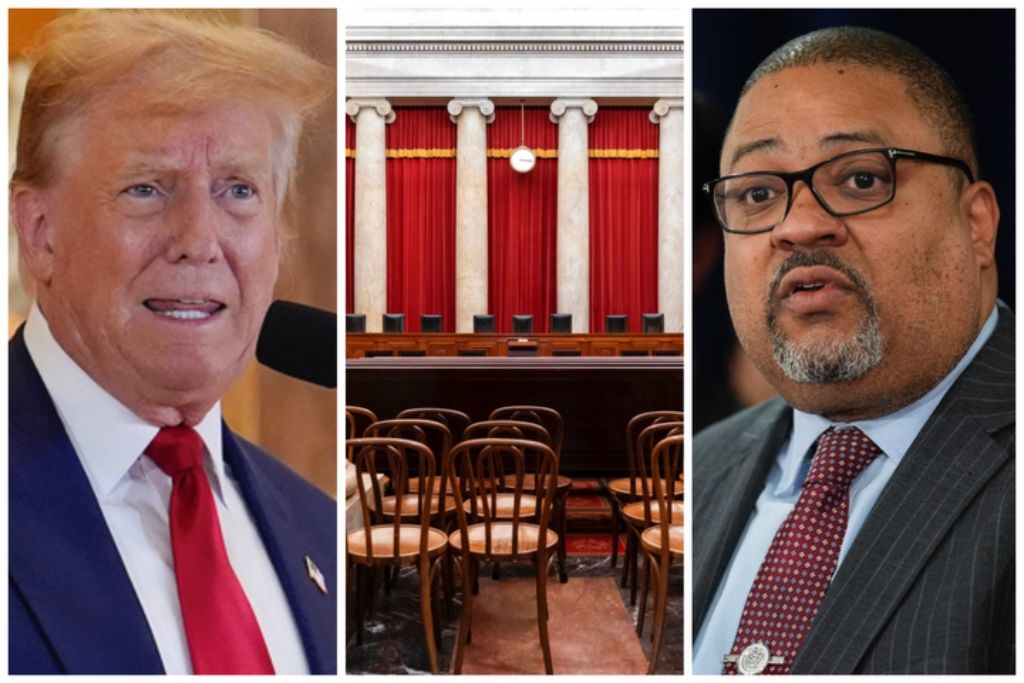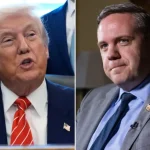
Former President Donald Trump has urged the Supreme Court to intervene in his hush money case in New York despite legal experts suggesting the likelihood of this happening soon, or at all, remaining low at this point.
Trump, the leading Republican candidate for president, made his long-shot call for Supreme Court intervention in a post Sunday on Truth Social, days after a Manhattan jury found him guilty of 34 felony counts of falsifying business records.
However, most legal experts say Trump’s case must first navigate the New York state appeals process, which could take years under normal scheduling procedures. Only after exhausting state appeals can Trump petition the Supreme Court, which typically addresses matters of federal or constitutional law.

“Trump has a lot of arguments on appeal, but most of those are state arguments,” former federal prosecutor Neama Rahmani told the Washington Examiner.
“The federal ones would have to really relate to a procedural or more likely a substantive due process. So, you know, things like a change of venue or the judge’s failure to disqualify himself on some of his daughter’s political activity, maybe he can make those arguments,” Rahmani said.
Some of Trump’s allies have also advocated a quick Supreme Court review. Speaker of the House Mike Johnson (R-LA) reflected Trump’s sentiments in a Fox News interview last week, asserting that the Supreme Court should intervene.
A jury convicted Trump of falsifying business records in the first degree for incorrectly labeling payments to his former attorney Michael Cohen, whom Trump reimbursed in 2017 for Cohen’s effort to suppress porn star Stormy Daniels’s affair allegations ahead of the 2016 race. But the felony conviction meant the jury also had to have found Trump intended to commit “another crime” by falsifying the documents. The jury did not have to say as part of its verdict what that other crime was, although they did have to agree behind the scenes that there was an intent to commit one of several additional crimes, according to Merchan’s jury instructions.
To make a compelling case to the Supreme Court, which is inherently difficult at this stage, Trump’s legal team would need to argue that his trial violated federal law or his constitutional rights, such as Trump’s due process rights under the 14th Amendment for prosecutors failing to target a specific predicate offense. Or Trump’s legal team could argue that the convictions involved a wrongful application by Manhattan District Attorney Alvin Bragg’s office of the Federal Election Campaign Act, which is federal law and not state law. Other potential federal issues that could be open for Supreme Court review include Trump’s constitutional challenge to the gag order Merchan imposed. These arguments must have been explicitly raised during the initial trial to be considered by the Supreme Court, and Trump attorney Todd Blanche appeared to do so on multiple occasions.
Conversely, disputes over the admissible evidence that Merchan allowed into the trial, such as Daniels’s explicit detail about the “positions” she and Trump allegedly had sex in, or the array of other entanglements in Trump’s other civil court cases that prosecutors would have been able to ask him about if he had taken the witness stand would be solely for the state appeals court to handle.
The typical appeals process involves filing an appeal with the New York State Appellate Division. If unsuccessful there, Trump could appeal to the New York Court of Appeals, the state’s highest court.
Rahmani said it is possible for Trump to continue pursuing all available state court appeals while also petitioning the Supreme Court, and if the justices denied Trump’s petition at this point, he could attempt an appeal again once the New York’s highest court has heard and ruled on his appeal.
Other legal experts, such as veteran appellate attorney Alan Dershowitz, have suggested Trump could also attempt to jump straight to New York’s highest court on the basis that prosecutors sought a speedy start to the trial before the election and that Trump should have his appeal expedited before Nov. 5 as well.
“Under the current schedule, what could easily happen is this: He gets sentenced to some probation or some suspended sentence — something where he doesn’t have to go to prison but where he’s convicted. … He does that, campaigns, and loses the election,” Dershowitz said of a potential timeline of events for Trump.
“And then between Nov. 5 or the inauguration, the court reverses the conviction. … I think there’s a possibility the Supreme Court would say that. I think there’s a possibility the New York Court of Appeals would say that,” Dershowitz added.
Assuming it’s a close election in November, Dershowitz said, “Would anyone blame Donald Trump at that point for saying, ‘This is an unfair election’?” Dershowitz added that he hopes Trump’s attorneys seek to “expedite the sentencing and expedite the appeal,” suggesting that since prosecutors rushed the case to trial, “you have to agree to rush to get a potential appellate reversal.”
The New York Appeals Court has in recent months disagreed with the ways in which lower courts conducted trials. In April, that court ruled 4-3 to overturn Harvey Weinstein’s 2020 rape conviction, concluding the jury was potentially prejudiced against the defendant because the judge permitted women to testify about allegations that were not part of the case to prove Weinstein’s intent. That decision centered on at least one core issue similar to Trump’s case, including a judge permitting prosecutors to ask about irrelevant misconduct if the defendant chose to testify.
One pro-Trump legal scholar who is facing disbarment for his own alleged involvement in efforts to subvert the 2020 election, John Eastman, said Sunday that Trump’s lawyers could make an extraordinary request to the Supreme Court to expedite his case to the justices.
“I urge Trump’s legal team to file a writ of habeas corpus, an original writ, with the Supreme Court of the United States,” Eastman said on Frankspeech.com. “It’s a rare move, but I think it needs to be done given these extraordinary circumstances, before people start seeking remedies on their own. … All the marbles are in play right now.”
Rahmani pointed out that the Supreme Court is already weighing whether Trump has immunity from the Jan. 6 indictment in Washington, D.C., levied by special counsel Jack Smith. The former prosecutor said even if the justices found some immunity, it could be difficult to make the case that the ruling should apply to Trump in the hush money case because the evidence prosecutors put forward in that indictment involved some events that occurred before Trump was elected in November 2016.
The Supreme Court previously rejected Trump’s claims of immunity from a grand jury subpoena in which Bragg’s predecessor, Cy Vance, sought Trump’s tax and financial records.
Justices Samuel Alito and Clarence Thomas dissented from that decision. Alito said the court’s majority did not impose enough burden on lawmakers to show a need for the records, and Thomas said Congress lacked the power to subpoena private records from anyone absent the context of an impeachment effort.
“If a sitting President were charged in New York County, would he be arrested and fingerprinted?” Alito wrote, saying the “entire imagined scene is farcical.”
“Could he be sent to Rikers Island or be required to post bail? Could the judge impose restrictions on his travel? If the President were scheduled to travel abroad — perhaps to attend a G-7 meeting — would he have to get judicial approval? … If he were convicted, could he be imprisoned? Would aides be installed in a nearby cell?” Alito added.
CLICK HERE TO READ MORE FROM THE WASHINGTON EXAMINER
The Supreme Court rarely intervenes in state criminal cases, with an acceptance rate of less than 1%, and it has a tendency to uphold state court convictions.
The chances of the Supreme Court reviewing and reversing Trump’s conviction are exceedingly slim, though Trump’s recent comments suggest he might just try.
Scroll down to leave a comment:
[Fancy_Facebook_Comments]






